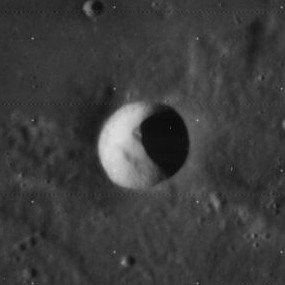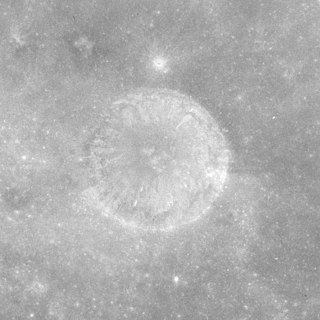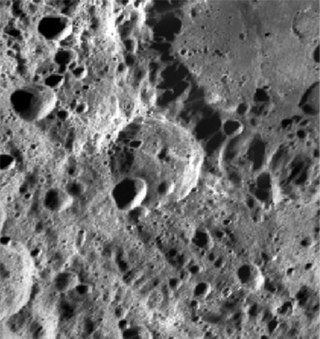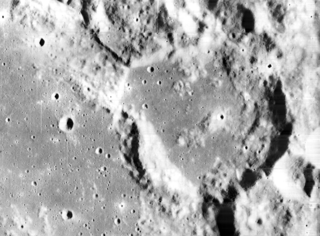
Bancroft is a small, bowl-shaped impact crater located to the southwest of Archimedes on the Mare Imbrium. A wide, shallow depression runs from the rim of Bancroft southeast to the Montes Archimedes. There are some clefts at the edge of the mare to the west and southwest of the crater. Other prominent craters are two small craters nearly to the west named Feuillée and Beer.
Abetti is a lunar impact crater that has been completely submerged by mare lavas. It forms a 'ghost crater' in the surface, showing only a curved rise where the rim is located. Abetti is located near the southeast edge of Mare Serenitatis, to the west of the Mons Argaeus. This crater is generally visible only at low angles of illumination. It is named after two Italian astronomers, Antonio Abetti and his son Giorgio.

Fahrenheit is a tiny lunar impact crater located in the southeast part of the Mare Crisium. This area of the surface is nearly devoid of impact features of interest. To the east are the Dorsa Harker wrinkle ridges, and beyond them is Promontorium Agarum at the edge of the mare. The landing site of the Soviet Luna 24 probe is located about 15 kilometers to the southeast.

Asada is a small lunar impact crater located at the northern edge of Mare Fecunditatis, to the northeast of the crater Taruntius. It is a circular crater formation with inner walls that slope down toward a small central floor at the midpoint. Asada was designated Taruntius A prior to being named by the IAU.

Avery is a small lunar impact crater located near the eastern limb of the Moon. This is a circular, bowl-shaped formation with a small interior floor. It lies near the western edge of Mare Smythii. To the east is the crater Haldane, and to the southwest is Carrillo. Gilbert lies to the southwest.

Beketov is a small lunar impact crater that lies in the northern reaches of the Mare Tranquillitatis. It is named after Russian chemist Nikolay Beketov. To the south is the ghost crater Jansen R. Northeast of Beketov, along the edge of the mare, is the crater Vitruvius. Beketov was previously designated Jansen C before being named by the IAU. The flooded crater Jansen itself lies to the south.

Egede is the remains of a lunar impact crater that has been flooded by lava, leaving only the somewhat polygonal circumference of the rim protruding just above the mare. It was named after Dano-Norwegian natural historian Hans Egede. It is located on the southern edge of the Mare Frigoris, to the west of the crater Aristoteles. To the southwest is an arc of low mountains curving between the rims of Aristoteles and Eudoxus. The floor of Egede is flat and nearly featureless, except for a few tiny craterlets, including secondaries from Aristoteles. The surviving rim has a maximum altitude of 0.4 km above the surface.

Cameron is a small lunar impact crater that lies across the northwest rim of the crater Taruntius. It was named after American astronomer Robert Curry Cameron, by his wife, lunar specialist Winifred Cameron. This formation is circular and cup-shaped, with no particular distinguishing features. It was previously designated Taruntius C.

Taruntius is a lunar impact crater on the northwestern edge of Mare Fecunditatis. It was named after ancient Roman philosopher, mathematician and astrologer Lucius Tarutius Firmanus. To the northwest is the lava-flooded crater Lawrence, and to the north lie the craters Watts and da Vinci.

Bohnenberger is a lunar impact crater that lies near the east edge of the Mare Nectaris, in the foothills of the Montes Pyrenaeus mountain range that forms the perimeter of the mare. To the east beyond the mountains is the larger crater Colombo. The crater has a low rim along the north wall, and the floor is somewhat irregular with a ridge crossing the floor. There is a small crater along the western inner wall.

Secchi is a small lunar impact crater formation on the northwest edge of Mare Fecunditatis. It was named after the 19th-century Italian astronomer Angelo Secchi. To the northeast is the crater Taruntius. The western rim is joined with a section of the minor Montes Secchi range. The rim of this crater has been opened in the northern and southern ends, leaving two curved ridges facing each other across the crater floor. To the south is a pair of rilles designated the Rimae Secchi. These lie near the edge of the mare, and have a combined length of about 40 kilometers.

Calippus is a small lunar impact crater that is located on the eastern edge of the rugged Montes Caucasus mountain range in the northern part of the Moon. It was named after Greek astronomer Callippus of Cyzicus. It lies to the southwest of the crater remnant Alexander, to the northwest of the Mare Serenitatis.

Belyaev is a lunar impact crater that is attached to the outer edge of the Mare Moscoviense, on the far side of the Moon. It is a worn formation with a small crater pair overlaying the southern rim, and several smaller craters across the relatively irregular interior.

Black is a small lunar impact crater that lies just to the southeast of the walled basin Kästner. To the south-southwest is the crater Ansgarius, and to the east is the small Dale. It is located near the eastern limb of the Moon, just to the southwest of the Mare Smythii.

Watts is a small lunar impact crater that is located at the extreme northern edge of the Mare Fecunditatis. It was named after American astronomer Chester Burleigh Watts. Just one crater diameter to the northwest is the irregular da Vinci. Farther to the south is the larger crater Taruntius.

Lawrence is a lunar impact crater that is located on a section of terrain to the east of Mare Tranquillitatis and northwest of Mare Fecunditatis. It was named after American physicist and Nobel laureate Ernest Lawrence and American astronaut Robert Henry Lawrence, Jr. To the southeast is the larger crater Taruntius. The rille designated Rima Cauchy crosses the eastern part of the Mare Tranquillitatis and reaches as far as the northern rim of Lawrence.

Condon is a lunar impact crater that lies on the eastern shore of the Sinus Successus, a bay along the northeast edge of Mare Fecunditatis. It was named after American physicist Edward U. Condon in 1976. It lies midway between the larger crater Apollonius to the north and the smaller Webb to the south on the Mare Fecunditatis. Condon was previously designated Webb R.

Feuillée is a small lunar impact crater in the eastern part of the Mare Imbrium. It was named after French natural scientist Louis Feuillée. It lies less than a half crater diameter to the northwest of Beer, and the two formations form a nearly matched pair. To the west is the small but prominent crater Timocharis.

Eckert is a tiny, isolated lunar impact crater in the northern part of the Mare Crisium. This crater forms a circular pit in the dark surface of the surrounding lunar mare. Just to the west is a wrinkle ridge in the mare surface, a feature that is prominent only under oblique lighting from the Sun. The nearest craters of note are Peirce to the west-northwest, and Picard to the southwest. Both of these craters lie in the Mare Crisium basin.

Couder is a small lunar impact crater that is located just behind the western limb of the Moon, in a region of the surface that is brought into view during favorable librations. It lies on the inner foothills of the Montes Cordillera, a ring-shaped mountain range that surrounds the Mare Orientale impact basin.





















